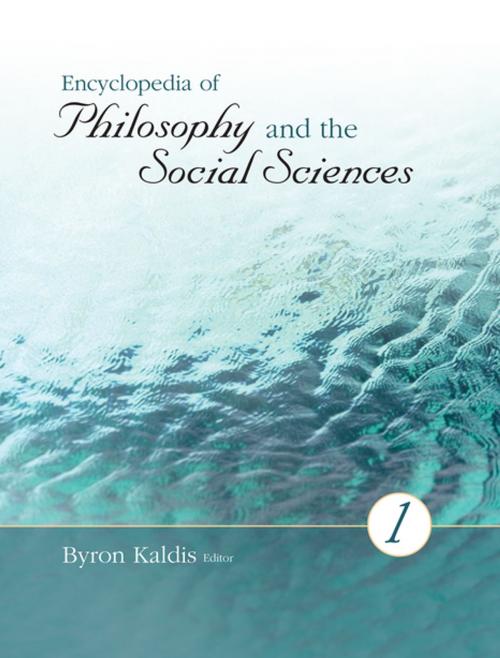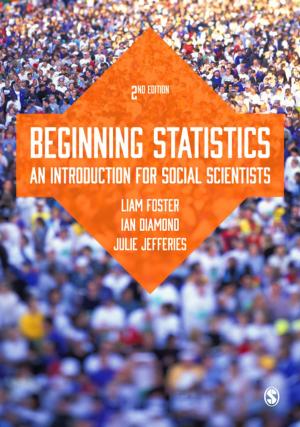| Author: | ISBN: | 9781506332611 | |
| Publisher: | SAGE Publications | Publication: | March 7, 2013 |
| Imprint: | SAGE Publications, Inc | Language: | English |
| Author: | |
| ISBN: | 9781506332611 |
| Publisher: | SAGE Publications |
| Publication: | March 7, 2013 |
| Imprint: | SAGE Publications, Inc |
| Language: | English |
"This encyclopedia, magnificently edited by Byron Kaldis, will become a valuable source both of reference and inspiration for all those who are interested in the interrelation between philosophy and the many facets of the social sciences. A must read for every student of the humanities."
Wulf Gaertner, University of Osnabrueck, Germany
"Like all good works of reference this** Encyclopedia of Philosophy and the Social Sciences** is not to be treated passively: it provides clear and sometimes controversial material for constructive confrontation. It is a rich resource for critical engagement. The Encyclopedia conceived and edited by Byron Kaldis is a work of impressive scope and I am delighted to have it on my bookshelf.”
David Bloor, Edinburgh University
"This splendid and possibly unique work steers a skilful course between narrower conceptions of philosophy and the social sciences. It will be an invaluable resource for students and researchers in either or both fields, and to anyone working on the interrelations between them."
William Outhwaite, Newcastle University
The Encyclopedia of Philosophy and the Social Sciences is the first of its kind in bringing the subjects of philosophy and the social sciences together. It is not only about the philosophy of the social sciences but, going beyond that, it is also about the relationship between philosophy and the social sciences.
The subject of the Encyclopedia is purposefully multi- and inter-disciplinary. Knowledge boundaries are both delineated and crossed over. The goal is to convey a clear sense of how philosophy looks at the social sciences and to mark out a detailed picture of how the two are interrelated: interwoven at certain times but also differentiated and contrasted at others. The Entries cover topics of central significance but also those that are both controversial and on the cutting-edge, underlining the unique mark of this Encyclopedia: the interrelationship between philosophy and the social sciences, especially as it is found in fresh ideas and unprecedented hybrid disciplinary areas.
The Encyclopedia serves a further dual purpose: it contributes to the renewal of the philosophy of the social sciences and helps to promote novel modes of thinking about some of its classic problems.
"This encyclopedia, magnificently edited by Byron Kaldis, will become a valuable source both of reference and inspiration for all those who are interested in the interrelation between philosophy and the many facets of the social sciences. A must read for every student of the humanities."
Wulf Gaertner, University of Osnabrueck, Germany
"Like all good works of reference this** Encyclopedia of Philosophy and the Social Sciences** is not to be treated passively: it provides clear and sometimes controversial material for constructive confrontation. It is a rich resource for critical engagement. The Encyclopedia conceived and edited by Byron Kaldis is a work of impressive scope and I am delighted to have it on my bookshelf.”
David Bloor, Edinburgh University
"This splendid and possibly unique work steers a skilful course between narrower conceptions of philosophy and the social sciences. It will be an invaluable resource for students and researchers in either or both fields, and to anyone working on the interrelations between them."
William Outhwaite, Newcastle University
The Encyclopedia of Philosophy and the Social Sciences is the first of its kind in bringing the subjects of philosophy and the social sciences together. It is not only about the philosophy of the social sciences but, going beyond that, it is also about the relationship between philosophy and the social sciences.
The subject of the Encyclopedia is purposefully multi- and inter-disciplinary. Knowledge boundaries are both delineated and crossed over. The goal is to convey a clear sense of how philosophy looks at the social sciences and to mark out a detailed picture of how the two are interrelated: interwoven at certain times but also differentiated and contrasted at others. The Entries cover topics of central significance but also those that are both controversial and on the cutting-edge, underlining the unique mark of this Encyclopedia: the interrelationship between philosophy and the social sciences, especially as it is found in fresh ideas and unprecedented hybrid disciplinary areas.
The Encyclopedia serves a further dual purpose: it contributes to the renewal of the philosophy of the social sciences and helps to promote novel modes of thinking about some of its classic problems.















